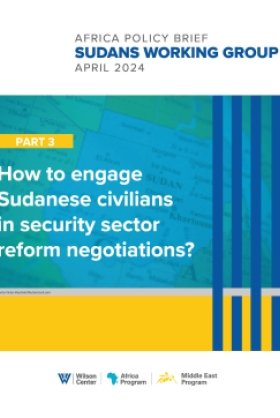Security and Environment in the Mediterranean
Although the environmental and security communities are difficult to integrate, Hans Günter Brauch argues that working together will prevent future crises and conflicts, as he launches his groundbreaking volume.
Overview
Launching his groundbreaking volume Security and Environment in the Mediterranean, Hans Günter Brauch visited the Wilson Center to discuss new approaches in the field. Although the environmental and security communities are difficult to integrate, Brauch argued that working together will prevent future crises and conflicts. The first volume in a four-part series, Brauch's book includes four approaches to security: the environmental security debate, the human security paradigm, the Grotian perspective (emphasizing multilateral cooperation and based on international law), and a proactive focus on conflict avoidance. Brauch argued that the United States and Europe must cooperate, and include developing nations in their dialogue, to further the environmental security agenda.
Brauch explained that it was important to understand the interactions between global environmental change, conflict, and other humanitarian emergencies. In the Middle East, for example, he outlined complex and detrimental linkages between six aspects of environmental change: soil erosion, climate change, agriculture, population growth, urbanization, and water shortages. Global climate change is projected to increase temperatures and reduce rainfall in Israel and the Occupied Palestinian Territories, resulting in less water for consumption and agriculture. Even as the amount of available water decreases, the population is expected to increase, and thus, demand for these limited resources will continue to rise. Although he does not believe the relationship is strictly causal, Brauch posited that food and water scarcity would interact with the region's political tensions to increase its instability.
Brauch also pointed out that global environmental change could make a developing country more vulnerable to devastating natural disasters. For example, he called Bangladesh—which is already plagued by droughts, floods, and cyclones—a "disaster in the making." Its low-lying territory would be extremely susceptible to rising sea levels: climate experts predict that 17 percent of Bangladesh's territory could be inundated, increasing the risk of health problems such as dengue fever and water-borne pathogens. Such natural events can contribute to social and political instability: extreme weather conditions have forced people to migrate to other parts of the country, leading to conflicts with the current inhabitants. Since these issues are interrelated, Brauch urged communities on both sides of the Atlantic to cooperate and commit to addressing environmental issues to increase human security and peace.
For more publications by Dr. Hans Günter Brauch: http://www.afes-press.de/html/download_hgb.html
Drafted by Shannon Green and Meaghan Parker.
Speaker
Hans Günter Brauch
Hosted By

Environmental Change and Security Program
The Environmental Change and Security Program (ECSP) explores the connections between environmental change, health, and population dynamics and their links to conflict, human insecurity, and foreign policy. Read more
Thank you for your interest in this event. Please send any feedback or questions to our Events staff.










